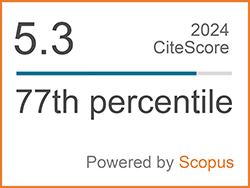Response Surface Methodology for Optimization of Biodiesel Production by Acinetobacter baylyi
Abstract
Biodiesel is conventionally produced through the transesterification reaction of alcohol and triacylglycerols (TAG). TAGs are obtained from oilseed plants, and animal fats, therefore the limited supply of TAG is the major bottleneck of the biodiesel production. in vivo esterification between fatty acid acyl-CoA and alcohol to produce FAAE is an alternative choice for biodiesel production. In this study, FAAE production by Acinetobacter baylyi was optimized using response surface methodology. The optimization process employed a Box-Behnken design, where the investigated variables were carbon source content, nitrogen source content, and shaking speed. Here, the value of the regression coefficient R2 = 0.8255 could be explained by the model which is high to advocate the significance of the model. The maximum FAEE yield, 1,026.6 mg/L, was obtained. It could be concluded that in vivo FAEE synthesis using A. baylyi as material is a novel way for the biodiesel production.
Keywords
Refbacks
- There are currently no refbacks.
 Applied Science and Engineering Progress
Applied Science and Engineering Progress







